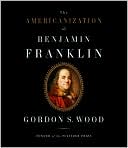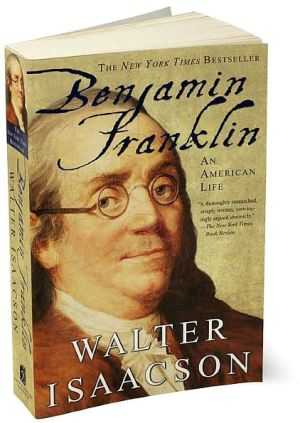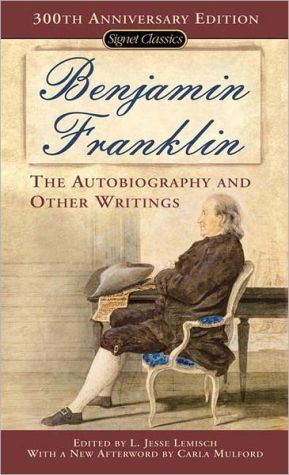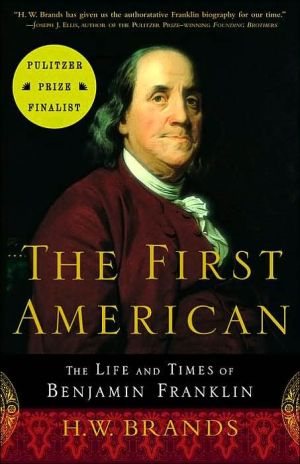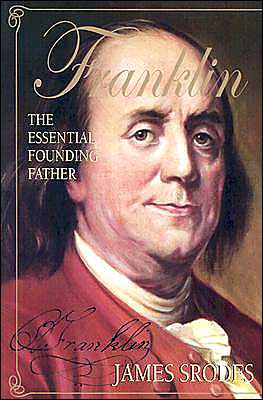The Americanization of Benjamin Franklin
Search in google:
From the most respected chronicler of the early days of the Republic—and winner of both the Pulitzer and Bancroft prizes—comes a landmark work that rescues Benjamin Franklin from a mythology that has blinded generations of Americans to the man he really was and makes sense of aspects of his life and career that would have otherwise remained mysterious. In place of the genial polymath, self-improver, and quintessential American, Gordon S. Wood reveals a figure much more ambiguous and complex—and much more interesting. Charting the passage of Franklin’s life and reputation from relative popular indifference (his death, while the occasion for mass mourning in France, was widely ignored in America) to posthumous glory, The Americanization of Benjamin Franklin sheds invaluable light on the emergence of our country’s idea of itself.Caspar Weinberger - ForbesThis has been an especially good reading summer for devotees of American Colonial and Revolutionary his-tory. First and, in my opinion, the best of the many new books covering this period is Washington's Crossing--by David Hackett Fischer (Oxford University Press, $35). Professor Fischer is a noted historian, whose Albion's Seed, published in 1989, tells the story of those descendants of the British who settled here and helped create the United States. His Paul Revere's Ride has also been widely and justly praised. Washington's Crossing tells the complete story of General George Washington's most daring, risky and successful venture early in the war. Following a succession of victories by the British and their mercenary forces, which had resultedin the loss of New York for the Americans, the British were within sight of Philadelphia, where the new American Congress was sitting. Washington's army had been all but destroyed, and the British were surging across New Jersey. Washington's decision to cross the Delaware River on Christmas night 1776, when it was considered virtually impossible, was a move both bold and foolhardy. A flotilla of small boats crammed with soldiers, guns and horses somehow rowed across the river through one of the East's worst winter snow and ice storms. (The crossing as painted by Emanuel Leutze in 1851 captured this event spiritually and has become a great icon of the Revolution.) By crossing the Delaware, Washington placed the remnants of his army in a position to trap the British behind Trenton and, a few days later, to give that army and the cause for which it fought its first real victory. In many ways the shots fired atTrenton were the shots "heard round the world." Professor Fischer conveys in a remarkably realistic way what combat and the fog of war are actually like. But, more important, he tells the story of what it was like for Washington to lead a discouraged, underequipped army that was constantly being micromanaged by a divided Congress that couldn't--at least at the beginning--decide whether it wanted independence or, simply, to get the Stamp Act repealed. For those who still wonder how the Revolutionaries ever defeated the huge British forces arrayed against them, both on land and at sea, this book makes clear that it was the military genius and leadership of George Washing-ton that turned almost certain defeat into victory. Washington's Crossing is an essential and exciting key to a more complete understanding and appreciation of what our ancestors did to win the Revolution. A new biography, Alexander Hamilton by Ron Chernow (Penguin Press, $35), is another superb book I read this summer. Hamilton served as principal aide to General Washington from the early days of the Revolu-tion. This gave him a ringside seat at the formation of the United States and its implausible victory over the British, who had deployed one of the world's finest military machines but lost to a ragtag army of upstarts. Chernow's splendid, thorough and brilliantly written biography gives us a new understanding of Hamilton's vi-tal role during the war and immediately after as Secretary of the Treasury of this new entity on the world's stage. I doubt that many people realize how much of our country's financial structure we owe to Alexander Hamilton. This book goes beyond the standard fare offered in most American history classes. Hamilton's towering intellect, as well as his many faults, and his long, fierce disagreements with Thomas Jefferson, John Adams and many of the other Founding Fathers are presented here with almost shocking candor. There have been other biographies of Hamilton, but Chernow's is far and away the most comprehensive and compelling of any I have read. It is a fitting tribute to the man who set the U.S. on the path that has made our nation the economic leader of the world. Another treat for Revolutionary history enthusiasts is The Americanization of Benjamin Franklin by Gordon S. Wood (Penguin Press, $25.95). This delightful new study focuses on the actual aristocratic and elitist views and opinions of this so-called populist leader, who was one of our best-loved, most influential and renowned spokesmen to the world. Moving away from Revolutionary times, I next read, and thoroughly enjoyed, Miles Gone By: A Literary Autobiography byWilliam F. Buckley Jr. (Regnery Publishing, $29.95). Buckley, a major founder of today's sen-sible conservatism, has led an extraordinary life, which fully matches his extraordinary talents. His subtitle is apt, as the book contains essays on sailing, skiing, music, old friends and colleagues and all manner of other diverse subjects, which are united in that they have all been of interest to one of the best minds and writers in America today.
